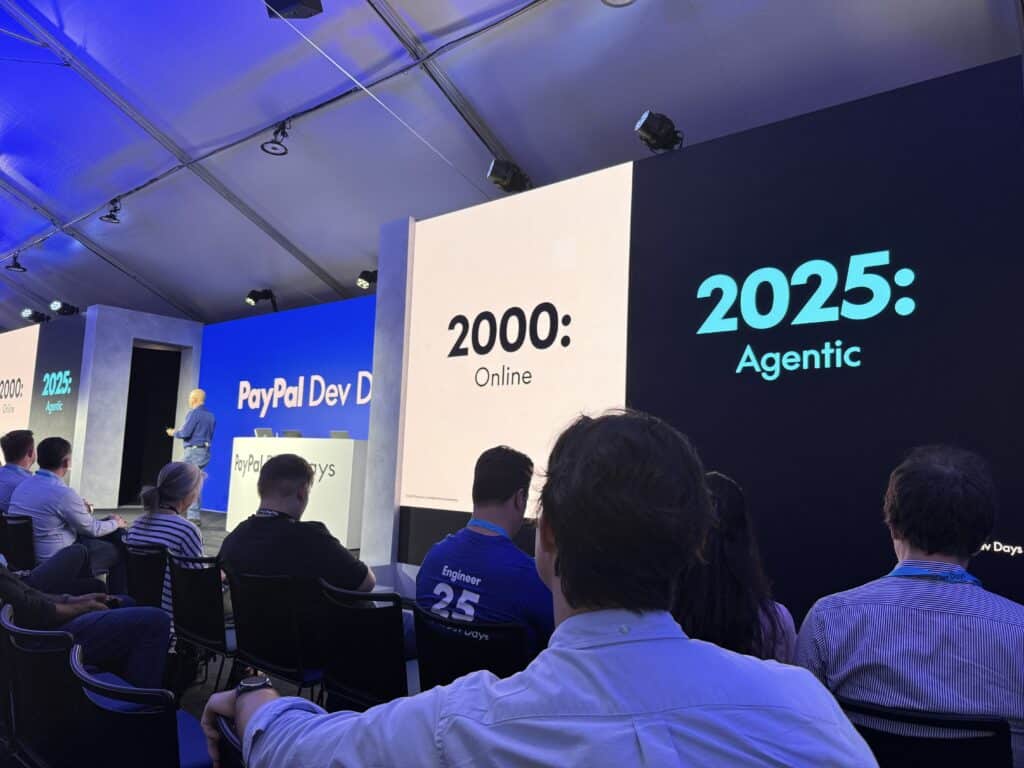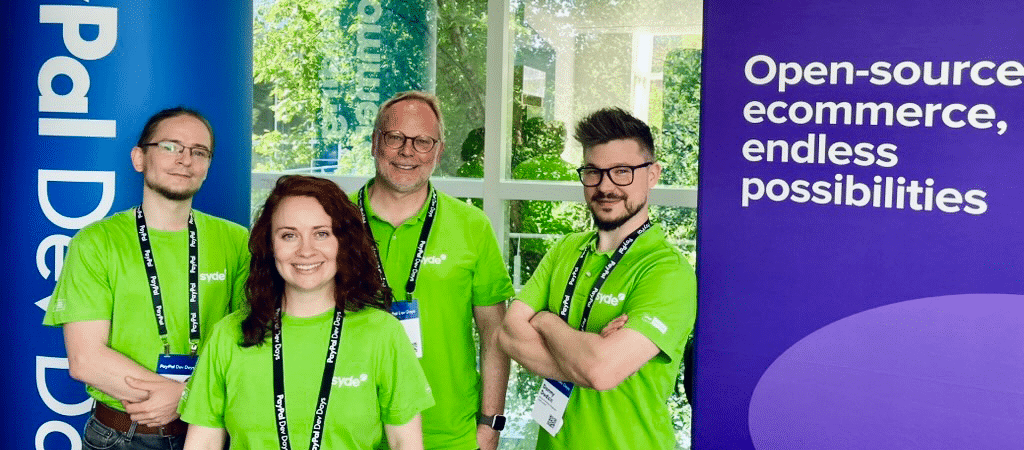Last month, four of us from Syde – Oliver, Sonja, Moritz, and Danny – had the opportunity to attend PayPal Developer Days 2025 in San Jose. We returned with industry insights about the future of commerce that will fundamentally reshape our approach to WooCommerce payment gateway development. Here’s what we learned and how we’re preparing to evolve for what’s next.
The Dawn of Agentic Commerce
The buzzword at this year’s event was unmistakable: agentic commerce. While PayPal continues to actively develop and support its comprehensive suite of core products, like recently launched Fastlane, this year’s Dev Days clearly positioned agentic commerce as the next frontier. PayPal hasn’t abandoned their focus on checkout optimization – rather, they’ve expanded their vision toward enabling AI to transact on behalf of customers. This isn’t just a trendy concept – it’s a paradigm shift that’s about to transform how consumers interact with e-commerce stores, including the hundreds of thousands of WordPress and WooCommerce merchants who use our payment gateway integrations.
As Sonja remarked, “The 3-day event was very focused on AI & Agentic Commerce and they made it very clear that the way we are building and interacting with websites and shops will fundamentally change in the future.”

What Exactly Is Agentic Commerce?
For those who may not know the term, agentic commerce is AI that is capable of finding the best product for you according to your preferences and user profile and making purchases on behalf of consumers. Think of saying to your AI assistant, “I want new running shoes like my previous pair but in blue” – and the AI takes care of everything from searching across various stores to actually making the purchase using your preferred payment method whilst keeping in mind your purchase history, profile and preferences.
The implications for our WooCommerce shop but also for your payment gateway development are profound. The traditional funnel of discovery, consideration, and checkout is being compressed into a single conversation. As developers of the official PayPal integration for WooCommerce, we need to rethink how transactions will be processed and authorized in this new paradigm.
The comprehensive lineup of agentic AI sessions showed PayPal’s commitment to staying at the cutting edge of payment innovation, creating tools that simplify commerce experiences for merchants and consumers alike. This vision directly impacts how we approach our payment gateway integrations moving forward.
Beyond the Buzzword
The Evolution from GenAI to Agentic AI
The shift from generative to agentic AI is a significant leap in artificial intelligence capability. Generative AI can create content based on prompts, but agentic systems extend these capabilities by pursuing their own goals, creating sophisticated plans, and acting with minimal human intervention.
This transformation reshapes AI from being assistive to ideation, to one that is actively performing tasks and generating concrete results.
It can be observed with beneficial effect in the banking sector: while generative AI does content work such as developing research reports and regulatory briefs, agentic systems assume responsibility for critical functions such as real-time fraud detection, dynamic risk assessment, and autonomous treasury operations.
This type of innovation provides tremendous value in the form of revenue protection, enhanced customer experiences, and operational efficiencies. Financial services will be transformed in the future by agentic AI in the form of conversational banking interfaces, end-to-end integrated financial solutions, and automated compliance systems—revolutionizing the way financial institutions operate and deliver services and reducing the need for human intervention.
The Customer Flow in Agentic Commerce
From the customer perspective, agentic AI and specifically agentic commerce offers several benefits:
- Conversational Shopping: Customers interact through natural language and camera input rather than navigating websites.
- Cross-Platform Search: AI agents search across multiple stores simultaneously.
- Preference-Based Recommendations: The AI agent remembers preferences and previous purchases.
- Streamlined Authentication: Simple one-time password (OTP) identity checks maintain security while reducing friction.
- Unified Experience: Seamless transition from conversation to confirmed purchase.
The Merchant Revolution in Agentic Commerce
The merchant side of agentic commerce is equally transformative. Store owners will be able to manage their businesses through conversational AI interfaces rather than complex dashboards. A merchant might simply say, “Show me yesterday’s sales breakdown,” or “Reorder inventory for low-stock items”.
The bidirectional nature of agentic commerce—where merchant AI and customer AI interact through standardized protocols—enables automated personalization at scale. Merchant systems can proactively respond to customer preferences, negotiate prices based on purchase history, and dynamically bundle related products without human intervention, reducing operational overhead while improving customer experiences.
PayPal’s New Developer Arsenal
The most exciting reveal for our team was PayPal’s introduction of their Agent Toolkit and MCP (Model Context Protocol) server – essentially the infrastructure that will allow developers like us to build agentic commerce capabilities into our payment gateway integrations.
The tools connect to larger industry shifts in remarkable ways, creating a pathway toward truly unified commerce experiences – something we’re excited to bring to the WooCommerce ecosystem.
The Demos That Changed Our Thinking
Three main stage demonstrations fundamentally altered how we’re thinking about our PayPal integration for WordPress:
- Google Cloud’s AI Shopping Companion: Google demonstrated how their Agent-to-Agent Protocol allows merchants to integrate Gemini-powered chat experiences with PayPal’s commerce capabilities. For our payment gateway integrations, this means developing conversational checkout experiences where customers can ask questions and complete purchases in the same interface.
- AWS’s Real-Time Product Digitization: The ability to scan physical products and instantly create shoppable digital storefronts using Amazon Nova foundation models presents interesting opportunities for improving the connection between inventory management and payment processing within WooCommerce.
- Microsoft’s Personalized Azure AI Experiences: The personalization capabilities showcased how AI can remember customer preferences across shopping journeys, which will be particularly valuable for our payment gateway integrations that handle recurring payments and subscriptions.
These demonstrations illustrated how seamless the transition can be from conversation to transaction. No more redirects or complex checkout forms. Just a natural dialogue that ends with a purchase confirmed.
The event wasn’t just about ideas and concepts. PayPal and their partners showed working prototypes that made it clear: this technology is here now, not years away. As developers of multiple payment gateway integrations, this accelerated timeline means we need to start implementing agentic-ready structures today.
The PayPal-WooCommerce Partnership: A Foundation for Agentic Commerce
A key highlight of the event was seeing the strong WooCommerce presence. The Woo booth drew steady traffic throughout Dev Days, showcasing the critical partnership between PayPal and WooCommerce. This collaboration is particularly significant as we move into the agentic commerce era, as it will serve as the foundation for delivering enhanced checkout experiences to hundreds of thousands of WooCommerce merchants.
As the official PayPal WooCommerce integration developers, this established partnership provides us with a strategic advantage. While other e-commerce platforms will need to build new relationships with payment providers to support agentic commerce, our deep experience with both PayPal’s systems and WooCommerce architecture positions us perfectly to lead this transition.
Danny noted the seamless connection between the two companies as their representatives interacted throughout the event, reinforcing the shared commitment to evolving the checkout experience. This relationship will be vital as we evolve the PayPal integration from traditional to agentic commerce capabilities.
Trust and Security in the Age of AI Shoppers
One of our primary concerns heading into the event was how security would work when AI is handling transactions – a critical consideration for any payment gateway developer. PayPal’s approach is reassuring: consumers still perform a one-time password (OTP) identity check to verify purchases, and PayPal’s network helps verify legitimate merchants.
Trust is the cornerstone of commerce, whether human or AI-driven. PayPal’s solution maintains the security checkpoints while removing the friction, an approach we’ll be integrating into our payment gateway architecture.
How Syde is Preparing Payment Gateways for the AI Shopping Era
Based on what we learned at Dev Days, our team has already begun mapping out how our WordPress payment gateway integrations can prepare for agentic commerce:
- Conversational Commerce Endpoints: We’re exploring how to create interfaces that will allow AI assistants to interact with WooCommerce through natural language.
- Hybrid Checkout Experiences: While we transition to agentic commerce, we’re designing systems that will work both with traditional checkout flows and AI-driven transactions.
- European Compliance Frameworks: Given the EU’s strict data protection and AI regulations, we follow European-specific implementation guides for our payment gateways that address the unique regulatory landscape.
The Multi-Billion Dollar Opportunity
PayPal describes agentic commerce as a “multi-billion-dollar opportunity,” and after witnessing the technology firsthand, we believe this is actually an understatement. WordPress powers approximately 43% of the web, and adapting payment gateways to capture the agentic commerce wave represents an enormous opportunity both for Syde as a payment integration developer and for our payment provider partners.
The payment solution providers that adapt to agentic commerce fastest will deliver tremendous value. This isn’t just another payment integration feature – it’s reshaping the entire transaction experience.
Panagiotis Kriaris, an important voice in FinTech, points out that the stakes in this race are extraordinarily high:
“The players that get this right won’t just win conversions. They’ll own the customer relationship. The ones that don’t will find themselves disintermediated by someone else’s agent.”
Looking Ahead
PayPal’s Dev Days 2025 made it clear that the company is committed to leading this revolution with PayPal’s CEO Alex Chriss emphasizing they’re “building with velocity” and partnering with the biggest players in AI to create this new ecosystem.
The four of us returned to Europe with not just new technical knowledge, but a fundamentally different vision of what commerce will look like in the very near future.
The question isn’t whether AI will transform how people shop online – it’s how quickly payment systems can adapt to this new reality.
With the insights gained at PayPal Dev Days 2025 and our position as experts in WooCommerce payments solutions, Syde is positioned to help lead that transformation.
Interested in learning more about how agentic commerce will impact payment processing for WordPress and WooCommerce? Contact our team at Syde to learn more about our implementation roadmap for payment gateway integrations and other WooCommerce solutions.
Related articles
-

Why Choosing the Right CMS Can Make or Break Your Website
When it comes to building a website that actually works for your business, the CMS isn’t just another tool, it’s the backbone of the entire operation.
-

Rethinking WordPress Multisite: Simpler, Smarter, More User-Friendly
When WordPress 3.0 was released back in 2010, named Thelonious after jazz pianist Thelonious Monk, it introduced a feature that fascinated me immediately: Multisite.
